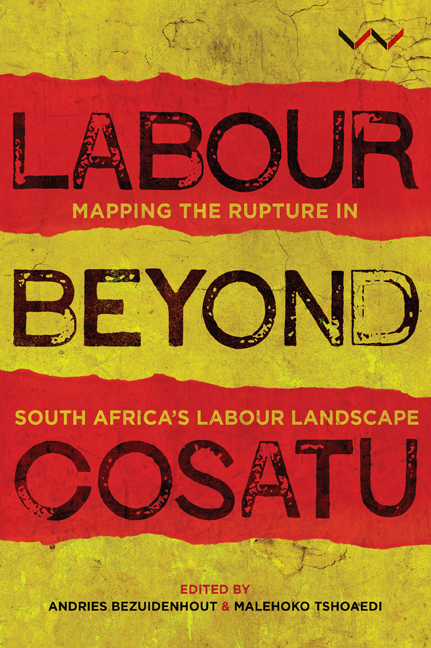Book contents
- Frontmatter
- Contents
- Figures and Tables
- Abbreviations and Acronyms
- Preface
- Chapter 1 Democracy and the Rupture in South Africa's Labour Landscape
- Chapter 2 Research in a Highly Charged Environment: Taking Democracy Seriously, 2014
- Chapter 3 The Social Character of Labour Politics
- Chapter 4 Is Cosatu Still a Working-Class Movement?
- Chapter 5 Labour Aristocracy or Marginal Labour Elite? Cosatu members' income, other sources of livelihood and household support
- Chapter 6 The Politics of Alliance and the 2014 Elections
- Chapter 7 Cosatu, Service Delivery, Civil Society and the Politics of Community
- Chapter 8 The Politics of Male Power and Privilege in Trade Unions: Understanding sexual harassment in Cosatu
- Chapter 9 Internal Democracy in Cosatu: Achievements and challenges
- Chapter 10 Public Sector Unions in Cosatu
- Chapter 11 Are Cosatu's Public Sector Unions Too Powerful?
- Chapter 12 Labour Beyond Cosatu, Other Federations and Independent Unions
- Contributors
- Index
Chapter 7 - Cosatu, Service Delivery, Civil Society and the Politics of Community
Published online by Cambridge University Press: 21 March 2018
- Frontmatter
- Contents
- Figures and Tables
- Abbreviations and Acronyms
- Preface
- Chapter 1 Democracy and the Rupture in South Africa's Labour Landscape
- Chapter 2 Research in a Highly Charged Environment: Taking Democracy Seriously, 2014
- Chapter 3 The Social Character of Labour Politics
- Chapter 4 Is Cosatu Still a Working-Class Movement?
- Chapter 5 Labour Aristocracy or Marginal Labour Elite? Cosatu members' income, other sources of livelihood and household support
- Chapter 6 The Politics of Alliance and the 2014 Elections
- Chapter 7 Cosatu, Service Delivery, Civil Society and the Politics of Community
- Chapter 8 The Politics of Male Power and Privilege in Trade Unions: Understanding sexual harassment in Cosatu
- Chapter 9 Internal Democracy in Cosatu: Achievements and challenges
- Chapter 10 Public Sector Unions in Cosatu
- Chapter 11 Are Cosatu's Public Sector Unions Too Powerful?
- Chapter 12 Labour Beyond Cosatu, Other Federations and Independent Unions
- Contributors
- Index
Summary
INTRODUCTION
South Africa has seen an explosion of protest in recent years – protests in the poor, working-class townships and informal settlements in every city, and in many small towns across the provinces. These protests, termed ‘service delivery protests’ as many (although by no means all) of them are demanding the provision of services, are usually targeting the local authorities or municipal councillors responsible for such services in the townships where the protestors live.
How do organised workers, who are members of the same working class, respond to or interact with these protests? Do they share the demands of the protestors? Do they perhaps provide leadership – organisational or strategic – to these protests, based on their trade union experience? This chapter explores the relationship of Cosatu members to ‘the community’ – and whether there are in reality two working classes: those in formal employment, living in formal townships, and those who are at the margins of the economy and society, without jobs or services.
The ‘service delivery protest’ phenomenon has drawn a significant amount of academic attention, and a range of explanations: see Karl von Holdt et al. (2011), The Smoke that Calls; Peter Alexander (2010), The Rebellion of the Poor; and Doreen Atkinson (2007); among others. Von Holdt and his colleagues have reflected on how the protests are integrally related to local power dynamics within the African National Congress (ANC), and that the ANC itself is ‘the locus of many of these struggles and contestations’ (Von Holdt et al. 2011: 7). Many of the protests are led by ANC activists or activists from other members of the Alliance, notably the South African Communist Party (SACP). In one of the case studies documented in The Smoke that Calls, a trade union leader was also among the leadership of the protests. However, there has been little reflection on the relationship of members of Cosatu affiliates to these protests. As the protests are in the main residentially based – in that people who are resident in a particular locality have a grievance related to that locality, whether it be a demand for housing or for toilets or clean water – it could be expected that workers living in these areas might share the demands and participate in the protests.
- Type
- Chapter
- Information
- Labour Beyond CosatuMapping the Rupture in South Africa's Labour Landscape, pp. 111 - 128Publisher: Wits University PressPrint publication year: 2017



